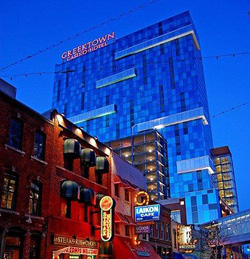
Rep. Iden supports several forms of expanded gambling, but David Murley worries about the impact on Detroit gaming venues like Greektown Casino.
Michigan Attorney General Mike Cox testified before a House panel to discuss an online gambling bill. In the hearings on Wednesday, Mike Cox supported legalized online gambling in Michigan.
The Michigan online gambling bill was introduced to the House of Representatives recently by State Rep. Brandt Iden, a Republican from Oshtemo Township. Attorney General Box was one of three people who spoke at the hearing on Wednesday in support of the bill.
Iden and Cox argue that the bill would lead to a large increase in tax revenues for Michigan. Those who spoke at the hearing also argued that online gambling would not have a negative impact on the 26 land-based casinos which exist in the state.
Statistics from the New Jersey online gambling industry show that 80% of online gamblers never step foot in a brick-and-mortar casino in a year’s time, so the two niches do not cannibalize each other’s revenues.
Streamlined Michigan Online Gambling Bill
Mike Cox was a convincing speaker on the subject. He said that Iden’s online gambling bill was a streamlined version of one introduced earlier this year in the Michigan Senate by Mike Kowall.
Sen. Mike Kowall’s bill never reached the floor of the Senate, though its sponsor has not pulled it from consideration yet. In hopes that the current bill meets a better fate, Attorney General Mike Cox gave a spirited defense of regulated online gambling instead of the strict ban on Internet gambling currently in place. Cox said that said that “this will lead to increased revenue at the same time protecting consumers.”
Why Regulated Online Gambling Is Better
The argument is a common one. To proponents of online gambling, prohibition traditionally has proven ineffective, simply driving play underground to unregulated gaming site. Regulation allows for responsible gaming measures to be enforced, along with consumer protections and age verification tools.
To those who support Iden and Kowall, it only makes sense to support legal online gambling. It is an additional revenue source for the land-based casinos, undercuts illegal online gambling operators, and draws revenue for the state.
Arguments Against Michigan Online Gambling
Opponents of an online gambling bill say that iGaming would hurt business for the state’s tribal casinos, as well as Detroit’s three casino operations. If the Detroit-area casinos were hurt by competition from online and mobile gaming sites, it would hurt the tax revenues of Detroit, which is still in a recovery phase from its severe economic downturn.
Those who oppose Brandt Iden’s proposal also note that federal gambling laws are contradictory, so legalized online gambling could lead to costly legal cases. One of those detractors gave forceful arguments that online gambling would be complicated in Michigan.
David Murley on Tribal Gaming Laws
David Murley, the Michigan Gaming Control Board‘s deputy director, spoke at the hearings on Wednesday. Murley said, “A lot of these questions are new, and so we don’t know where courts will come down on them.”
The Michigan Gaming Control Board is neutral on the subject of online gambling. At the same time, Deputy Director Murley said that tribal gaming law would complicate any potential Michigan online gambling implimentation. Tribal-state gaming compacts likely would need to be renegotiated, because the tribes would have to give up sovereignty status on gaming issues to simply launch commercial gaming websites.
Three-Fourths Majority Needed to Change Law
Even more daunting might be passage of an online gambling bill. Due to a longstanding gambling law which states people must be physically present in a casino before making a wager, it would take a three-fourths majority to pass the necessary law to make Internet gambling legal. In an age of hyper-partisanship, few issues can garner 75% of the votes in both houses of the legislature.
David Murley said lawmakers needed to consider Detroit’s recovery before changing the state’s gaming laws. The Michigan government spent $195 million of the tobacco fund to bail out the City of Detroit in 2014. Since then, Detroit has recovered financially, but full recovery is not complete.
Effects on Detroit’s Casinos
The Michigan gaming regulator pointed out that a casino built just across the border in Toledo, Ohio had hurt Detroit’s casino. Murley told the House Committee on Wednesday, “You may be hurting one of your other policy goals, which was to lead Detroit out of a bankruptcy.”
Mike Cox’s Online Gambling Testimony
That is where the testimony of someone like Attorney General Mike Cox is important. Cox’s testimony showed that online casinos and poker sites do not cannibalize customers the way rival brick-and-mortar casinos do. The clientele is different.
Poker Players Alliance President John Pappas gave similar testimony to Mike Cox on Wednesday. Though Pappas is an expert panelist, his testimony served to reinforce what the Michigan attorney general said. Michigan lawmakers know the attorney general better.
Brandt Iden’s Support of Expanded Gambling
Rep. Brandt Iden is a staunch supporter of expanded gambling in Michigan. To the state representative, gambling represents a way for the state to increase revenues without raising taxes. Rep. Iden joined State Rep. Robert L. Kosowski in penning an opinion piece in the spring of 2017 which called for Michigan to pass sports betting legislation.
At the time, Iden and Kosowski wrote, “Because the Constitution does not specifically mention that sports betting is illegal, it is therefore unconstitutional for the federal government to ban that practice. While the Supreme Court has requested input from the solicitor general of the U.S. on the legal merits of the case, many states like Michigan are preemptively introducing legislation in the event that the betting ban is found unconstitutional.”
